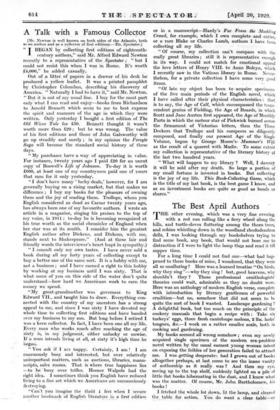A Talk with a Famous Collector
[Mr. Newton is well known on both sides of the Atlantic, both
as an author and as a collector of first editions.—En. Spectator.] `'-T. BEGAN by collecting "first editiOns of eighteenth- century authors," said Mr. Alfred Edward Newton recently to a representative of. the.. Spectator ; " but I could not resist this when I was in Rome. It's worth 14,000," he added casually.
Out of a litter, of papers in a drawer of his desk he produced a yellow leaflet. It was a printed pamphlet by Christopher Columbus, describing his discovery of America. " Naturally I had to have it,".said Mr. Newton. " But it is out of my usual line. I buy for the most part only whatI can read and enjoy—books from Richardson to Anold Bennett which seem to me to best express the spirit and manners of the age in which they were written. Only yesterday I bought a first edition of The Old Wives Tale for £50. Bennett thought it wasn't worth more than £20 ; but he was wrong. The value of his first editions and - t'hose of John Galsworthy will go up steadily and surely ; in my opinion the Forsyte Saga will become the standard social history of these days.
" My purchases have a way of appreciating in value. For instance, twenty years ago I paid £20 for an uncut copy of Boswell's Life of Johnson. To-day it is worth £660, at least one of my countrymen paid one of yours that sum for it only yesterday. .
" I don't have many ' lucky deals,' however, for I am generally buying on a rising market, but that makes no difference ; I buy my books for the pleasure of owning them and the joy of reading them. Trollope, whom you English considered as dead as Caesar twenty years ago, has always been one of my favourite authors. I wrote an article in a magazine, singing his praises to the top of my voice, in 1911: to-day he is becoming recognized at his true worth as the social chronicler of England when her star was at its zenith. I consider him the greatest English author after Dickens, and Dickens, with me, stands next to Shakespeare." (And at these fair and friendly words the interviewer's heart leapt-in sympathy.) " I consult only my own tastes. I have never sold a_ book during all my forty years of collecting except to buy a better one of the same sort. It is a hobby, with me, not a business ; and I have earned a right to this hobby by working at my business until I was sixty. That is what some, of you on. this side of the water don't quite understand—how hard we Americans work to earn the money we spend.
"My great-grandmother was governess to King Edward VII., and taught him to draw. Everything con- nected with the country of my ancestors has a strong appeal to me, and since I was sixty I have devoted my whole time to collecting first editions and have handed over my business to my son. But long before I retired I was a keen collector. In fact, I have been one all my life. Every man who works much after , reaching the age of sixty is, in my judgment, either unlucky or unwise. If a man intends living at all, at sixty it's high time he began.
" You ask if I am happy. Certainly, I am ! I am enormously busy and interested, but over relatively unimportant matters, such as auctions, libraries, manu- scripts, sales rooms. That is where true happiness lies —to be busy over trifles. Horace Walpole had the right idea. I sometimes think you English have reduced living to a fine art which we Americans are unconsciously destroying.
"Can't you imagine the thrill 1 feel when I secure another landmark of English literature in a first edition or in a manuscript—Hardy's Far. From the Madding Crowd, for example, which I own complete and entiree or a- rare Blake or Charles Lamb, authors I have been collecting all my life.
" Of course, my collection can't compare with the really great libraries ; still it is representative enough in its way. I could not match for emotional appeal the love letters of Henry VIII. to Anne Boleyn, which I recently saw in the Vatican library in Rome. Never-. theless, for a private collection I have some _very good items. - "Of late my object has been to acquire specimens of the five main periods of the English: novel, which I have called after their- phygical characteristics : that is to say, the Age of Calf, which encompassed the trans- cendent genius of Fielding, the Age of Boards, in which Scott and Jane Austen first appeared, the Age of Monthly Parts in which the meteor star of Pickwick burned across the firmament of Victorian letters, then the Three Deckers that Trollope. and his compeers so diligently composed, and finally our present Age of the Single Volume, begun by George Moore's- Mummer's Wife as the result of a quarrel with Mudie. To some extent my collection is representative of the literary history of the last two hundred years.
" What will happen to my library ? Well, I daresay it will be sold after my death. So large a portion of my small fortune is invested in books. But collecting is the joy of my life. This Book-Collecting Game, which is the title of my last book, is the best game I know, and as an investment books are quite as good as bonds or shares."
























































 Previous page
Previous page